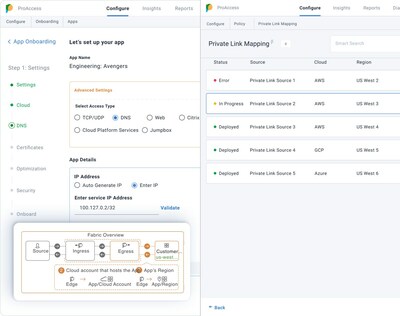Source prnewswire
Prosimo Launches Cross-Cloud Service Connect, a Single Click to Cross Cloud Networking
In March, Prosimo, a leader in multi-cloud networking solutions, announced the launch of a new set of capabilities under its Service Networking architecture called Cross-Cloud Service Connect.. As a result, the capability solves the technical limitations of hyperscalers' PrivateLink and endpoint networking solutions by extending them to multi-region and multi-cloud deployments. Any underlay can be used with this solution - the public cloud backbone, digital infrastructure providers or Google cross-connect - and they all act as a foundational substrate for the connectivity of cross-cloud services. The result is an easy way for applications & endpoints to connect natively and securely across clouds with just one click The result is an easy way for applications & endpoints to connect natively and securely across clouds with just one click A cloud-native solution unlocks three key use cases - distributed data access (e.g., AI / ML engine accessing data across clouds), B2B partner connectivity across clouds, and developer self-service to connect only the endpoints that are important to them. It is the cloud-native solution that unlocks three key use cases—distributed data access (e.g., an AI/ML engine accessing data across cloud providers), B2B partner connectivity across cloud providers, and developer self-service to connect only the endpoints that are important.In order for enterprises to implement various AI services from different clouds and access distributed data, there is a need to upgrade the network in the cloud in a timely manner in order to be able to interconnect these service endpoints in a secure and simple manner. It should be noted that cloud networking solutions in the market that focus solely on IP connectivity do not understand how service endpoints interact with the network. There has been a lot of talk about service mesh technologies for a while; enterprises struggle with their side car proxies and agents that do not scale or work well for PaaS applications," says Mani Ganesan, vice president of product at Prosimo. There has been a lot of talk about service mesh technologies for a while; enterprises struggle with their side car proxies and agents that do not scale or work well for PaaS applications," says Mani Ganesan, vice president of product at Prosimo.In spite of the fact that native cloud provider tools like PrivateLink are designed to solve problems for a single cloud region, they are not designed to solve problems across clouds and regions. "We built Cross-Cloud Service Connect in order to address this challenge for enterprises at such a critical point in their cloud adoption journey," Ganesan explained. As of today, connecting application and service endpoints across multiple clouds is an extremely complex taskThere are many challenges faced by enterprises when it comes to connecting applications and services across different clouds. As an example, AI & ML engines running on one cloud may require data access from a different cloud, and business logic in one cloud may require access to a different cloud native DB or S3 bucket in a different cloud. The hyperscalers offer innovative native networking services to their customers, but enterprises are still required to take manual steps & bring third-party proxy and networking stacks to enable cross-cloud connectivity, despite hyperscalers offering native networking services to their customers. The modern service mesh solutions are not designed to support cloud-native endpoints such as PaaS applications, and traditional networking stacks that work at the IP layer require heavy IT and time-consuming approaches, which can be quite costly and time-consuming The modern service mesh solutions are not designed to support cloud-native endpoints such as PaaS applications, and traditional networking stacks that work at the IP layer require heavy IT and time-consuming approaches, which can be quite costly and time-consumingIn addition to being lightweight, offering fine-grained access controls to ensure compliance and being more secure and cost-effective, Prosimo Cross-Cloud Service Connect is built using the Full Stack architecture. Moreover, Prosimo's integration with the layer 3 connectivity fabrics like Megaport makes it easy to connect clouds and regions in minutes. As a result of its role as the foundational connectivity layer, modern cloud infrastructure operations can be executed rapidly and efficiently.An example of cross-cloud connectivity in action The following are some of the key benefits of Prosimo Cross-Cloud Service Connect:Get the most out of cloud networking by unlocking agilityA number of Fortune 500 enterprises have already implemented Cross-Cloud Service Connect using this solution and have demonstrated its success in a number of use cases. Below is a list of the top three use cases customers are deploying:As a result of our partnership with Prosimo, we are able to provide fast, secure distributed access to business-critical data that can be accessed by various data management systems, including Google Cloud's BigQuery for interactive analysis of large datasets, as well as AWS Sagemaker for preprocessing and training models to perform sophisticated risk analysis. Here are a few examples of distributed data scenarios that enterprises have dealt with with this approach:There is also a case in which the solution has been proven to foster B2B partner connectivity in addition to ensuring security is a priority. By providing lightweight PrivateLink and endpoint-based architectures to connect only endpoints of interest across clouds, Prosimo achieved this goal.Finally, Cross-Cloud Service Connect removes the complexities associated with networking, access, and security requirements by eliminating the complexities associated with networking, access, and security requirements in order to improve the self-service capabilities of developers. As a result of this simplification, it is possible to seamlessly connect any application endpoint, including Fully Qualified Domain Names (FQDNs), IP addresses, containers, Kubernetes (K8), Platform-as-a-Service (PaaS), and serverless endpoints, with appropriate policies, to a network or security boundary. As a result of this simplification, it is possible to seamlessly connect any application endpoint, including Fully Qualified Domain Names (FQDNs), IP addresses, containers, Kubernetes (K8), Platform-as-a-Service (PaaS), and serverless endpoints, with appropriate policies, to a network or security boundary.Get in touch with Prosimo today



No Comments